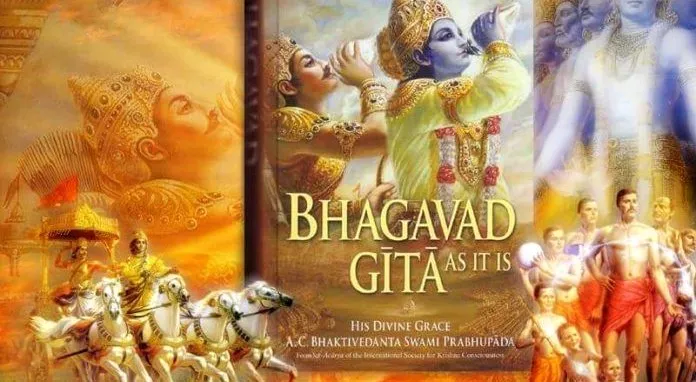Central message of shreemad bhagavad Gita.
Bhagavad Gita, “the divine song” is one of the greatest contributions India has made to the world. Gita’s subject is the war within, the struggle for self-mastery that every human being must wage. It addresses the most profound questions of life and gives not just philosophical clarity on the meaning of life but practical guidance on living a better life.
In the following note, I have tried to synthesize 15 central messages of the Gita for me. I have divided them into 4 sections –
1. Governing Thought
2. Meaning of Life
3. Path for Self/God Realization and
4. Practical Tips
~Governing Thought of the Gita~
1. Focus on selfless duty –
both the beginning and end of Gita are about Lord Krishna exhorting Arjuna to do his duty. Performing one’s duty selflessly and in accordance with Dharma is perhaps the most salient message of the Gita. Dharma is the universal law which holds all life together in unity. Each being must do its part in the grand scheme in things. Any code of life based on the satisfaction of mere desire leads to destruction. Therefore, selfless duty that goes beyond selfish motives and is for greater good is necessary. At the same time Gita encourages that action should be done with dispassion and without worrying about the outcomes. Performance of one’s duty is in all respects better than inaction. We have to do our duty and leave the outcome to the will of God.
~Meaning of life~
While Gita’s governing message is a call to action, it recommends we understand the meaning of life so it can guide us to right action
2. Nature of Self –
Starting point is to understand the nature of our Self. Our being has two aspects, the life spirit or the soul (Purusha, or Atman) that is eternal and indestructible, and the physical existence (Prakriti) that is transient and perishable. Life comes to be from this union of body and soul. The soul goes through cycles of life and death, and takes on new physical forms as if it is wearing and shedding clothes. This concept of the nature of self and recognition of the existence of soul is the core foundation from which then flow the various messages of Gita
3. Law of Karma –
The cycle of life and death that our eternal self goes through implies that the results of our current actions reflect in not just this life but also in future lives. Equally our situation in current life (intellect, tastes, inclinations) is because of latent impressions from actions in past life. When the soul departs from body after death, it takes with it a load of character or Gunas by the activities so far gone through.
This principle is key to understanding the apparent uncertainties of life and the lack of perfect correlation between input and output. At the same time, this principle of cause and effect teaches us that we ourselves are responsible for what happens to us, whether or not we understand how. It follows...
In the following note, I have tried to synthesize 15 central messages of the Gita for me. I have divided them into 4 sections –
1. Governing Thought
2. Meaning of Life
3. Path for Self/God Realization and
4. Practical Tips
~Governing Thought of the Gita~
1. Focus on selfless duty –
both the beginning and end of Gita are about Lord Krishna exhorting Arjuna to do his duty. Performing one’s duty selflessly and in accordance with Dharma is perhaps the most salient message of the Gita. Dharma is the universal law which holds all life together in unity. Each being must do its part in the grand scheme in things. Any code of life based on the satisfaction of mere desire leads to destruction. Therefore, selfless duty that goes beyond selfish motives and is for greater good is necessary. At the same time Gita encourages that action should be done with dispassion and without worrying about the outcomes. Performance of one’s duty is in all respects better than inaction. We have to do our duty and leave the outcome to the will of God.
~Meaning of life~
While Gita’s governing message is a call to action, it recommends we understand the meaning of life so it can guide us to right action
2. Nature of Self –
Starting point is to understand the nature of our Self. Our being has two aspects, the life spirit or the soul (Purusha, or Atman) that is eternal and indestructible, and the physical existence (Prakriti) that is transient and perishable. Life comes to be from this union of body and soul. The soul goes through cycles of life and death, and takes on new physical forms as if it is wearing and shedding clothes. This concept of the nature of self and recognition of the existence of soul is the core foundation from which then flow the various messages of Gita
3. Law of Karma –
The cycle of life and death that our eternal self goes through implies that the results of our current actions reflect in not just this life but also in future lives. Equally our situation in current life (intellect, tastes, inclinations) is because of latent impressions from actions in past life. When the soul departs from body after death, it takes with it a load of character or Gunas by the activities so far gone through.
This principle is key to understanding the apparent uncertainties of life and the lack of perfect correlation between input and output. At the same time, this principle of cause and effect teaches us that we ourselves are responsible for what happens to us, whether or not we understand how. It follows...




